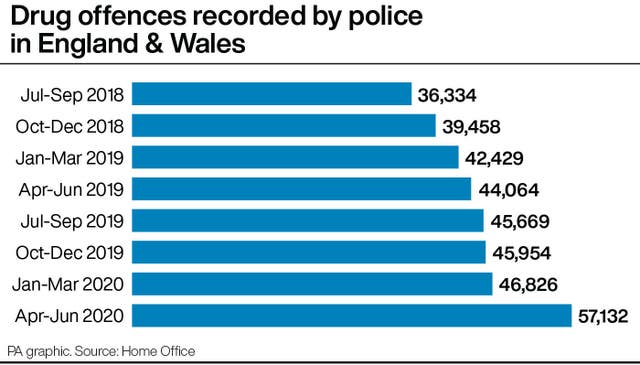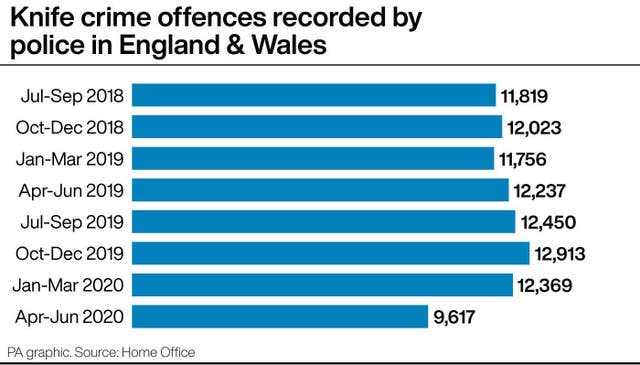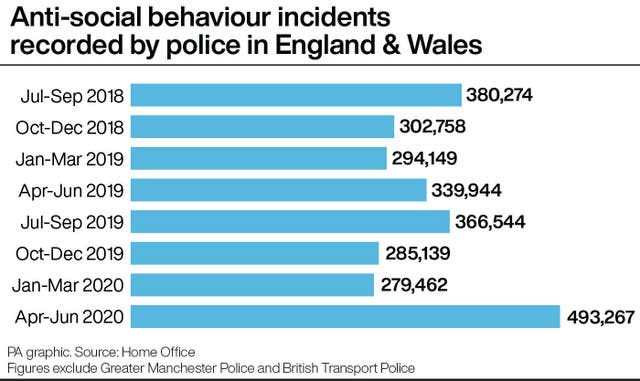Anti-social behaviour and drug crimes on rise during lockdown, figures show
There was also a rise in domestic abuse and stalking according to the Office for National Statistics.

Anti-social behaviour and drug offences shot up during lockdown while most other types of crime recorded by police plummeted as a result of the coronavirus pandemic, official figures show.
Domestic abuse as well as stalking and harassment also rose, according to the Office for National Statistics (ONS).
Anti-social behaviour incidents recorded by police soared by 45% from 339,944 in April to June 2019 to 493,267 for the same period this year.
Between January and March 2020, 279,462 incidents were recorded.
This covers a range of incidents causing a nuisance or disorder which could prompt alarm or distress – including things like noisy neighbours, drinking and drug use, graffiti, gangs congregating in the street and litter problems.

It includes reported breaches of lockdown restrictions to police and the latest increase may reflect this, the ONS said.
The Victims’ Commissioner previously warned the public were getting more angry and frustrated with noisy neighbours and other anti-social behaviour during lockdown, prompting a surge in complaints.
Dame Vera Baird also told MPs in April that the Government must be prepared for a “tsunami” of reports of domestic and sexual abuse once the coronavirus lockdown ends.
Police-recorded drug crimes rose by 30% from 44,064 in April to June 2019 to 57,132 during the same period this year.
Between January and March 2020, 46,826 drug offences were recorded.

Meanwhile, domestic abuse-related crimes recorded by police increased by 9% during lockdown from 182,562 in April to June 2019 to 198,112 for the same period this year.
Between January and March 2020, 187,653 were recorded.
There was also a 20% rise in stalking and harassment between April to June 2019 and the same period this year (up from 118,290 to 142,009 police-recorded crimes).
The figures are an exception to the general trend, which shows the levels of most other types of crime falling as the pandemic took hold, according to an ONS report published on Wednesday.
Overall, the total number of crimes recorded by police in England and Wales fell by 4% to around 5.8 million in the year to June.
Billy Gazard, from the ONS centre for crime and justice, said the drop in crime was “mainly driven by changes in society after coronavirus lockdown restrictions were put in place” but police recording of drug offences “increased sharply throughout the April to June period, reflecting proactive police activity as overall crime levels reduced”.

“There are indications that crime levels in June were moving back towards pre-lockdown levels,” he added.
Thefts and robbery fell in April to June by 43% and 47% respectively, compared to the same time last year, as a result of the time people spent at home during the pandemic.
There were 492,321 police-recorded thefts in April to June last year, compared to 280,087 this year.
In the same period in 2019 there were 22,475 police-recorded robberies compared to 11,961 in 2020.
There was a 9% fall in firearms offences (to 6,228) in the year to June and a 1% drop in those involving knives or sharp instruments (to 47,349 offences), which were driven by “substantial decreases in the April to June 2020 period”.
The drop in knife crime can be “wholly attributed to the large decrease seen in the lockdown period”, the ONS said, when offences involving knives and sharp instruments fell by 21% between April and June compared to the same period last year (from 12,237 to 9,617 offences).
But the number of homicides involving a knife or sharp instrument still rose by 2% in the 12-month period from 257 to 262 offences, with the number taking place in London going up by 14%.
This meant, of all recorded homicides in the latest year, 38% involved a knife or sharp instrument.
The total number of homicides also rose by 9% in the year to June from 668 to 725. This figure includes the bodies of the 39 Vietnamese people found in a lorry in Essex in October. Excluding this, the number would have risen by 3%.
The figures do not include Greater Manchester Police, who are unable to provide data due to ongoing problems with a new computer system.
The number of anti-social behaviour incidents excludes those recorded by British Transport Police.





